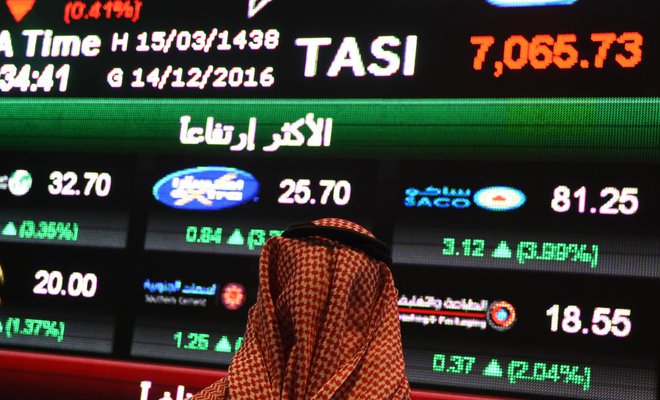
Saudi stocks to attract $45bn in foreign funds after upgrade
Saudi stocks will be included in FTSE Russell’s emerging market index from next year, opening the country’s bourse to billions worth of foreign investment inflows in the coming years.
The move by FTSE Russell is forecast to attract significant flows into the Kingdom from international funds that passively track emerging markets, as well as opening the door to increased investment from active funds as well.
“Saudi Arabia’s inclusion in the FTSE benchmark is the largest event in the emerging markets since 2001, and an important development for global investors,” the index provider’s CEO Mark Makepeace told a press conference in New York late on Wednesday, Reuters reported.
The upgrade will likely add about $5.5 billion of inflows from passive funds linked to the Saudi market, he said.
The Kingdom will account for about 2.7 percent of the emerging market index, rising to around 4.6 percent in the event of a 5 percent listing of Saudi Aramco, predicted to occur by early 2019.
Saudi Arabia’s entry into the index will be staggered from March to December 2019 to prevent destabilization among other markets, FTSE Russell said.
Emerging market upgrades by FTSE Russell and rival index provider MSCI — widely expected to be announced in June — may attract up to $45 billion of foreign inflows into Saudi stocks, including about $14 billion of passive investment, according to investment bank EFG Hermes.
“This development will further diversify the investor base of the Saudi market, and a more diverse investor base often leads to a more mature and less volatile capital market,” Mohammed El-Kuwaiz, the chairman of the Saudi Capital Market Authority, said at the New York event.
The promotion of Saudi Arabia to EM status “recognizes rapid and commendable development of the country’s equity markets, following a rigorous index-inclusion process that has spurred major market reforms that improved foreign investor access and confirmed the security of assets,” the index provider said.
“The Kingdom’s entry expands and diversifies the opportunity set for both passive and active investors, and gives access to a large, dynamic economy within the emerging-market universe.”
Saudi stocks have been on a tear for several weeks in anticipation of the upgrades, gaining rising nearly 10 percent since the start of the year.
“The (FTSE) decision is a demonstration of growing confidence among investors in the increasing openness of the country’s capital markets and the various attractive attributes associated with that, including improved corporate governance and transparency,” said Bassel Khatoun, chief investment officer of MENA Equities at Franklin Templeton Investments (ME) Limited.
“This marks the start of a two-year upgrade cycle for Saudi Arabia which will bring with it increased investor interest and significant foreign flows.”
The Tadawul closed down 0.4 percent on Thursday, its second consecutive day in the red, as investors booked profits.
“We don’t see this as a sign of fading bullishness on the outlook of the Saudi Market as the promotion to EM status paves the way for positive market performance down the line,” said Maytham Al-Awami, an institutional sales trader at Saudi Fransi Capital.
But the market may face a bumpy ride ahead of MSCI’s emerging market announcement in June, cautioned Sanyalak Manibhandu, head of research at NBAD Securities in Abu Dhabi.
“Once we have confirmation of the (MSCI) upgrade in June, you might see profit-taking on the Tadawul,” he said. “Between now and then come first quarter earnings, with some names potentially disappointing.”


























